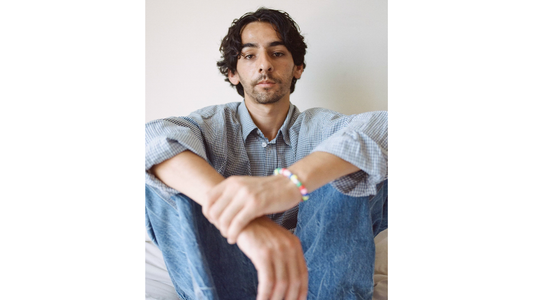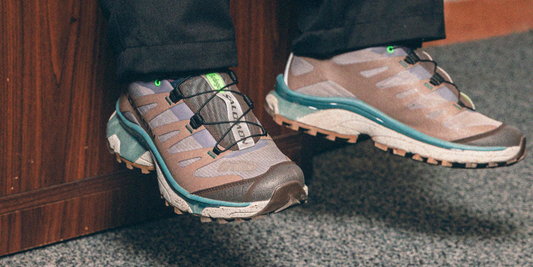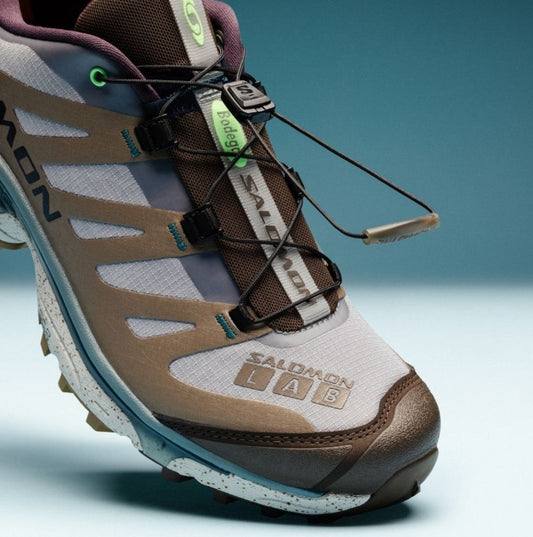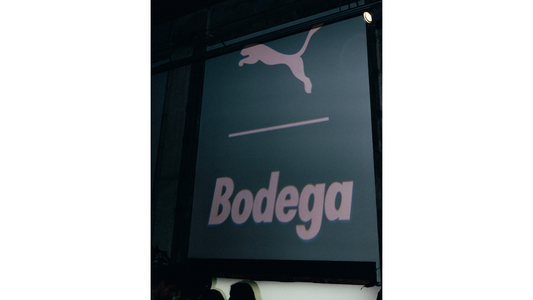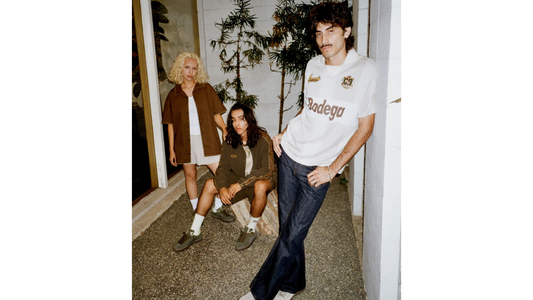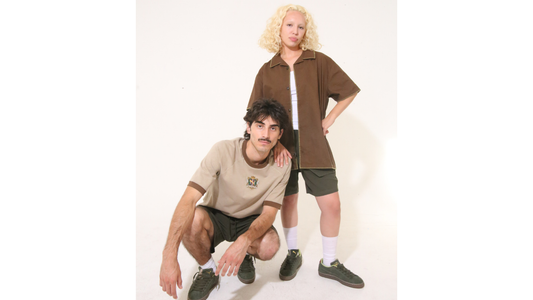From a very young age, Leighton Walsh knew what it meant to really hustle. Growing up between Jamaica and the US, he picked up any job he could to help support his mom. And it just so happened that one of those things, selling mixtapes on the street, became a proof-of-concept for a much larger career for this larger-than-life musician, DJ, MC, and producer. You may know him as Walshy Fire of Major Lazer but as you'll learn in our latest episode of Pirate Radio, he is so much more.
Q+A
Q: Growing up, you split your time between Half Way Tree, Kingston and Carol City in Miami, right? How did both places influence you musically in those days?
A: Half Way Tree is in the middle of Jamaica, man. It's the center, the heartbeat, like a bus terminal. Everything goes through there. So you end up seeing everybody - hearing the texture of it is just insane.
And then Carol City, in Miami was considered like the hood. It's where culture eminates from. I'm so glad that I came from two places with two extremely strong cultural influences.
Q: Right on. So what about the act of literally moving from one country to another? Was that a catalyst too, in kind of subconsciously mixing those two styles and types of music together?
A: Definitely. Thankfully, it was an easy one. I moved to Connecticut first when we came to America and then to Miami, but a lot of Jamaicans lived in Miami, man a lot. So it wasn't as hard. But the music was different. I immediately got really into Miami bass and hip hop. I started listening to Rakim and Eric B. That to this day is my favorite group.
And in Miami, we listened to pirate radio. The word 'pirate radio' can definitely be flung around. But it's an actual real thing that still happens in Miami. And I loved it a hundred million times more than a regular radio station. So when I got to Miami, you would have all these DJ crews on the radio, and then you had the dancehall stations playing dancehall all day long. I fell in love with it. Some days they'd be up, some days they'd be gone. It all depends on which way the wind blows. But I fell in love with the wild, wild west-ness of being able to say anything, do anything, play anything. Songs with curse words. Sometimes they wouldn't have a song play at all. They'd just talk the whole day, or take phone calls. It was the most fun I ever had listening to radio.
Q: We heard that back in the day you were selling mixtapes as a kid while transitioning from maybe a job at a barbershop?
A: Yeah, I did all of that. I had four jobs at the time, man. I worked at a barbershop in the hood, Mr. Russell's barbershop, and then I would sell cassette tapes like hip hop and dances hall, sound clashes. I would sell that kind of stuff out in the street. I’d walk around with a big boombox and a box full of cassette tapes, and I would sell them $5 for one, three for $10. And I would go from Carol City all the way to South Beach, and I would sell them everywhere. And then I got into selling fake New Era hats.
Q: Didn't know that one.
A: Yeah, I got into all kinds of stuff, man. And then I started working at this fast food chain called Long John Silvers. This was all at the same time, man, just working as many jobs as I could and giving 100% of my money to my mom. I never kept any of it for myself.
Q: I feel like you can't be a shy dude going around selling tapes like that. Were you ever nervous to approach people or?
A: I always felt like I was handing somebody something that they really wanted. And then I would always get return customers. I put my number on the tape, and somebody would always call me and be like, 'Yo, I bought a tape from you in the street. I want to get a couple more'.
Q: All right, so you got your start in music young, but what directed you to the path of being a DJ/MC/producer versus maybe other musical outlets or paths?
A: My mom played music in the house all the time - then when I started to sell the cassette tapes, I really dove into reggae and dance songs.
But it wasn't until I went to Clark Atlanta University and got an internship at the jazz station did it get more serious - rest in Peace to Glenn Simmons (the one that gave Walshy that gig). I would do reel-to-reel. I would cut the commercials, I would set up the overnight programming. I would sit there all night with scissors and tape, and I would cut the songs because back then radio played reel to reel, not digital anything.
Understanding jazz, knowing the players, knowing the records, knowing the album covers deep diving into Blue Note records, probably like no one should. Just an insane amount of deep diving. And that's where the real love for music started. It was official. And that's when I started to DJ because on the radio I started to talk and then eventually people would say, ‘Hey, do you want to host a show? We hear you talking on the radio, do you want to come on the show?’
Q: How would you describe your sound and how would you say it's evolved over the years?
A: My sound is definitely a blur of Miami and Jamaica, no question. It evolved when joining Major Lazer and I started to incorporate more EDM elements. Over time I've added and added and added and added and added. And you go to India and you go to Africa and you go absorb all these new elements of music. I've traveled the world and I've heard music from everywhere, and I've been immersed in their music, and now it stays with me.
Q: Do you remember the first show that you MCed or performed at?
A: It would've been in college. Probably some little hole in the wall, but most likely the Royal Peacock Club in Atlanta.
Q: So Black Chiney - how did you link up with them? Who are they?
A: Yeah, man, they’re the biggest sound system ever. And it was started by Supa Dups and Bobby Chin, and everyone in the group is either half-Chinese or full-Chinese. So my mom is Chinese and my dad is African. And so that's how Black Chiney came about.
So I met them because they're all from Miami and somebody knew somebody. I played this party and a guy that saw it knew Bobby Chin, and he was like, ‘Yo, you would be great for Black Chiney. And so the next party that I knew Black Chiney was playing at - my friend Roger B goes, ‘Yo, you got to go to this party, if you're going to meet Black Chiney, you got to go to this party called Stages'. And so we came up with a plan to go to the party very early while everyone's setting up and just walk in with records. Who would question that?
We sit down. The party starts around 11. By 12 there's probably 2000 people there. I started DJing because none of the other DJs showed up. So I ended up getting time because everyone else thought they were a star, a superstar. ‘You want to just start playing? Somebody hired you, right? Go ahead and play.’
Q: Early bird catches the worm!
A: Thankfully nobody showed up till 1AM. So I ended up playing for two and a half hours, and I was really good at understanding what that part of the party was. Most DJs now probably don't get what I'm about to say, but we call it the 'early warm', it's a part of the party where you play no hits, you play nothing but rare grooves, deep cuts. You don't even go remotely into a certain higher tempo. You just basically are saying, ‘Yo, everybody go get a drink’. But I was so masterful at it. And Bobby saw that. And so when I was done with my set, he was like,’ Yo, man, you're really good. You should be a part of Black Chiney’. And then one week later I was flown out to Montreal for my first show.
Q: Now that we have that foundation, how would you compare it to your introduction to Major Lazer? Or is it connected?
A: Diplo was a fan of Black Chiney. Our mutual friend Scared Boy who was the MC was like, ‘We're doing this Major Lazer show. You got to come out'. So I went out, met Diplo, and he told me 'I love what you're doing. Can I get some remixes?’. I sent him some remixes, and we remained friends. And then Scared Boy turned Christian, and when Scared Boy turned Christian, he asked, ‘Do you want to take some of these shows that I got now?' San Francisco was the first show. I want to say it was at The Waldorf. And then immediately, man, that night he was like, 'Do you want to do this full-time?' And that was it.
Q: When you first started out with Major Lazer and you guys were starting to gel, did you have certain expectations for the group? Did you think it was going to blow up and relate to such a massive audience over a decade plus? Or was it always more just a passion project for pure musicianship?
A: Both man, I love it. It's a passion project. I love what's happening. Just like when I sold cassette tapes, I know what we're giving you is dope, just give us a chance. And that was Major Lazer. Once you gave it a chance and went and saw us live or listened to some of our records, we knew people were going to like it.
Q: So I guess related to that, but maybe larger scale regarding your career as a whole, what do you see as - you can take this however you want - spiritually or literally - but what do you see as the role of an MC?
A: A ceremony man, master of ceremony. It's never changed. There are not that many left. When I was coming up, every DJ talked, every DJ at a minimum said, 'Hi, my name is, how are you doing?' And 'Thank you, goodnight'. But for the most part, every DJ knew, 'Yo, put your hands up, put your hands up'. They all talked. They all went crazy. Now, not so much. And that's cool. It just is what it is. So the MC is not as prevalent anymore because you can go to a party and nobody's saying anything on the microphone the whole night and nobody cares. But when you get a good MC, you know it. And so the MC is still the master of ceremony, still, the person that's going to create and elevate the mood of the room.
Q: In 2019 with Mad Decent, you released your solo debut album, ABENG. After being in the music industry for so long, why was 2019 the time to release that album?
A: I have to say, man, shout out to Diplo every time for really encouraging it. He always said 'You need to produce records. You need to sign artists'.
And that's why it came out on Mad Decent Records. At that particular time, I saw that Afrobeats was about to blow up, so I said, 'I'm going to grab all the African artists I can and have them do songs with dancehall artists. So every track is one African, one Dancehall person, one African, one Caribbean person, every track. And I hope that when the books close people can look back and see how revolutionary that was.
Q: As an artist who's traveled the world and gone to so many different places, do you ever think of a certain show, concert, or festival as being the gold standard?
A: Yeah, it would have to be Nairobi, Kenya. Just everything connected in a way that no other show ever has. And we've done that show I think four times now. Absolute insanity. Everyone go on YouTube and go watch the clips from it and go on my SoundCloud. Listen to the live audio of Major Lazer in Nairobi, Kenya, one of the greatest shows ever, man, ever.
Q: Check that out, people! So back to MCing, onstage presence, confidence, and personality are definitely such a huge part of being a successful MC, but what about fashion sense? How has your personal style changed over the years, if at all?
A: My style was always rooted in Jamaican culture. So Clarks, mesh marinas, etc. Miami, you get the Dickies suits, and so the styles started to collaborate. And to this day, it hasn't changed. The only thing I will say that has changed is I'm much more minimal. I don't buy as much stuff anymore. I give away a lot of my clothes. I like what I like, I wear what I wear. I will also say I've begun to understand materials. I understand what's healthy and what's not. So I wear linen a lot now because I understand the health value of linen. I wear a hundred percent cotton. I wear wool.
Q: Last thing about clothes, are there any pieces that you still have from the early days?
A: Bro, I have a Tom and Jerry Iceberg sweater that I will not let go. I have an Iceberg hat with Charlie Brown on it. It's a reflective hat. It's red with a huge reflective thing. And every time I look at it, I think, man, I should throw this on Grailed or something. And then I'm like, no one has this.
Q: You’d be kicking yourself if you sell it, you have to keep it.
A: I do have a few left of my Ralph Lauren 1992 pieces too.
Q: 'Lo Heads' unite! Always a market for that stuff.
A: Yeah, I still have my original Ralph Cookie boots. I made a lot of clothes during the pandemic too. There's a Jamaican tailor down the street, Mr. Tony. And I would go thrifting for tablecloths, and we would turn tablecloths into T-shirts.
They're all fire because I was exclusively looking for African prints. I got a bunch of that stuff all made just for me. And I was like, 'Yo, I'm just going to wear this. I'm not going to wear anybody else's brand'. And then BODE came out. She's getting old stuff and repurposing it. And I thought that was dope. And then when I met her, she was a genuinely great person. Then she won the LV award. Now she's got multiple shops. Oh, man. There is no way she remembers me, but I definitely love what she's doing and I've always rooted for her.
Q: Flipping it back to music real quick as we're winding down. Obviously, your music knowledge is extensive, and your palette is so eclectic. With that in mind, is there a band or song or even a genre that fans might be surprised that you listen to?
A: Oh gosh, man, I got into Emo Rock.
Q: Let's go.
A: Yeah, man. I got super into it and I understand why people liked it. And I also understand why my hip-hop dancehall world did not like it. But okay: Elliot - Calm Americans, American Football - Never Meant, Mineral - Unfinished, Sunny Day Real Estate - Seven. And Saosin - I can tell.
Q: Last year, PBS did that documentary as part of American Masters on you. How did that come about and what was it like to make?
A: The person from PBS reached out to me and said, 'Hey, I've been watching what you're doing. I love what you do. Do you want to be a part of this thing?' And I was like, 'Are you crazy? I've watched American Masters my whole life.' To be in that grouping is just insane. They flew down to Brazil when I was working on the album there. It was just the coolest thing that ever happened.
Q: Alright, to close out. Any advice for the next generation who's pursuing their dreams right now?
A: Everybody that they see that's successful had 10, 15 years of no success. They don't see that part. Get up and do what you love. If your focus finally gets to be what you love, hopefully, you really mean it. And that means you're not looking for money, you're not looking for clout, you're not looking for fame, you're not looking for recognition. You love what you love. And if nobody's hiring you, booking you, buying your product, or inviting you anywhere, create the space yourself. Do it yourself.


